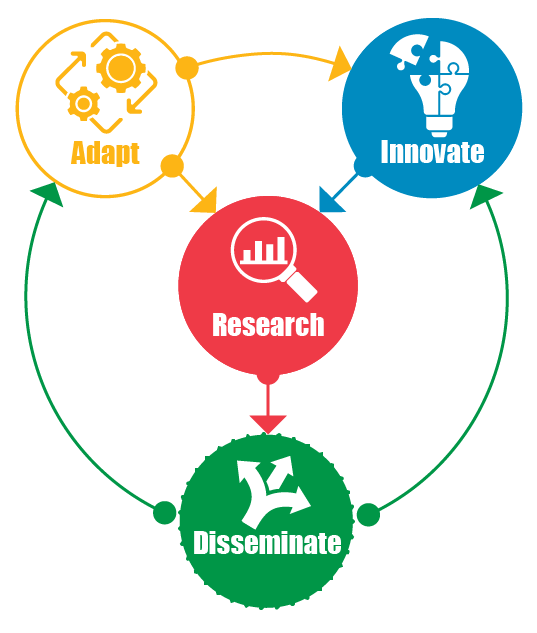GAITAR Fellowships
…target many diverse teaching contexts and learning objectives by supporting many instructor-generated teaching as research (TAR) projects with tangible, holistic support from Eberly Center colleagues from start to finish. However, data collection is centralized, by Eberly Center colleagues, not only to foster individual project dissemination, but also to help identify higher-level patterns in student outcomes, when possible. Fellowships and associated in-kind Eberly Center support may facilitate implementation of TAR project ideas originating during GAITAR Institutes or independently. Read the GAITAR Fellowship project descriptions here...
What is it?
Do generative AI tools (such as ChatGPT, Dall-E, Copilot) increase, decrease, or not change student learning and equity? In what teaching contexts? For which learning objectives?
Generative AI TAR Fellows receive a $5000 award and copious in-kind support from a team of Eberly Center colleagues to:
- design and implement a teaching strategy using a generative AI tool in a Fall 2026 or Spring 2027 CMU course;
- measure the impacts of generative AI tools on student learning and/or attitudes; and
- disseminate findings at CMU and beyond.
Fellows also participate in a special interest group of instructor-scholars and meet several times during the lifecycle of their project to build a CMU community of practice and share lessons learned regarding implementation and the student experience.
Instructor Eligibility
- All CMU instructors of record (faculty, staff, postdoc, graduate students) teaching on Pittsburgh, Silicon Valley, or Doha campuses are eligible to apply.
- Prior experience with generative AI or educational research is NOT required.
- Generative AI TAR projects must be implemented in a Fall 2026 or Spring 2027 course with an expected minimum enrollment of 15 students.
Project Requirements: Projects must include…
- a teaching strategy using a generative AI tool. This strategy can be small in scale, focused on one or more classroom activities or assignments.
- a control or comparison group (see one-pager for examples).
leveraging existing generative AI tools (such as adapting a tool to create a customized chatbot). Proposals for building new genAI tools will not be funded.
Expectations
This fellowship program involves a regular commitment from the Fellows who:
- Attend Fellows special interest group (SIG) meetings twice a semester during the fellowship year (May 2026-May 2027),
- Participate in asynchronous activities to support the Fellows SIG meetings,
- Work with Eberly consultants individually on project development and implementation,
- Collect data (with Eberly’s help) on faculty and student learning gains and experiences, with at least one direct measure of student outcomes,
- Contribute materials and resources to help the Eberly Center disseminate teaching strategies and lessons learned, and
- Disseminate one’s project (or part thereof) to CMU colleagues and/or beyond by:
- presenting at a CMU Teaching & Learning Summit and/or Spotlight on Innovative CMU Teaching event;
- disseminating on the Eberly Center TAR website;
- submitting a paper to a peer-reviewed journal or conference, with Eberly Center in-kind staff support or collaboration.
How can CMU instructors of record participate?
- We will issue requests for proposals (RFPs) at least once annually for three years.
- Submit a proposal by March 10, 2026
-
To apply, fill out this Google Form, which includes the following questions:
Course context
- What course (number) does your project target?
- How many sections of this course will you teach each semester?
- F26?
- S27?
- How many students do you expect to enroll per section?
Research project design
- What specific research question do you hope to answer about generative AI and student outcomes, with Eberly Center help?
- What is the new teaching strategy you propose? What generative AI tool will you use and how?
- In your proposed teaching strategy, will students use GenAI…
- As a thought or practice partner, but then students will do the graded work without genAI?
- To help create their deliverable/artifact that is graded?
- Both as a thought/practice partner and as a tool to create the deliverable/artifact?
- [Other]
- What student course work could you use as data to answer your research question? Please specify if this work is completed individually or in groups.
- How could you include a comparison group within a semester or across two semesters to help measure impacts (please see the assessment design 1-pager for examples)? Note: It is OK to propose teaching a course twice, once as a baseline and once with a change (e.g., F26 and F27).
Expected impact
- How do you predict that your use of generative AI will affect student learning and/or equity in your course?
- How could your proposed teaching strategy transfer to other course contexts or disciplines?
Eberly support
- What specific help would you want/need to receive while working closely with the Eberly Center?
- What are the major milestones of the project and your timeline for completing them (with Eberly Center help)?
Application due date: March 10, 2026
If you have questions about the application or the fellowship, email eberly-assist@andrew.cmu.edu. We encourage you to attend an information session on this and other Eberly fellowships (see dates and times below), and/or request a consultation on your project idea prior to submitting a proposal. Eberly colleagues can meet with each applicant once before the due date. We will not review actual proposals, but can discuss the requirements, try to answer your questions, and provide feedback on your ideas for research questions, teaching strategies, and/or plans for measuring impacts.
